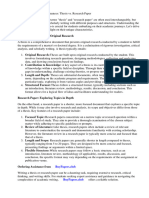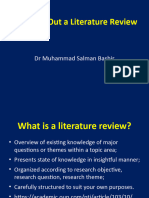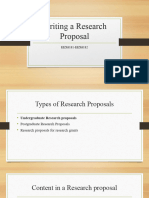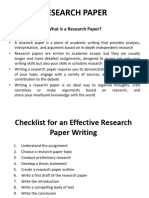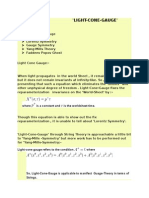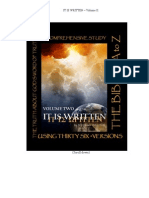0 ratings0% found this document useful (0 votes)
4 viewsLecture 1 EHS
Lecture 1 EHS
Uploaded by
azaaabdelgwad97Copyright:
© All Rights Reserved
Available Formats
Download as PDF, TXT or read online from Scribd
Lecture 1 EHS
Lecture 1 EHS
Uploaded by
azaaabdelgwad970 ratings0% found this document useful (0 votes)
4 views33 pagesCopyright
© © All Rights Reserved
Available Formats
PDF, TXT or read online from Scribd
Share this document
Did you find this document useful?
Is this content inappropriate?
Copyright:
© All Rights Reserved
Available Formats
Download as PDF, TXT or read online from Scribd
Download as pdf or txt
0 ratings0% found this document useful (0 votes)
4 views33 pagesLecture 1 EHS
Lecture 1 EHS
Uploaded by
azaaabdelgwad97Copyright:
© All Rights Reserved
Available Formats
Download as PDF, TXT or read online from Scribd
Download as pdf or txt
You are on page 1of 33
What Is Academic Writing?
Presented by prof. Dr. Hanaa El kazazz
Architectural glass des.prof., former head of glass dep.
What is academic writing?
• Academic writing is writing which communicates ideas,
information and research to the wider academic community.
• It can be divided into two types: student academic writing, and
expert academic writing,
Types of Academic text Definition
Essay A fairly short, self-contained
argument, often using sources from
a class in response to a question
provided by an instructor.
Research paper A more in-depth investigation based
on independent research, often in
response to a question chosen by
the student.
• What Is an Academic Essay?
• An academic essay is a structured form of writing students face in
school, college, and university as a part of their curricula.
• Compared to other types of academic writing, essays are usually
shorter in length and present the authors’ opinions to support
their arguments.
• Here are some key features of an academic essay for you to keep
in mind:
• Conciseness — as a rule, essays are short; the length of such
papers range from 200 to 500 words.
• Topic — due to their short lengths, a perfect topic for an essay
should be narrowed-down and not too broad.
• Well-structured text — although essays can be considered as one
of the least formal types of writing, they still need to have a solid
structure and follow the proper academic paper format.
• Clear central idea — every academic essay should deliver a
specific point that should be clear and powerful (i.e. thesis
statement).
• Personal motivation — unlike other types of writing, essays often
imply that their authors are personally interested in the subjects
they are discussing.
• Supporting facts, evidence, and examples — although essays may
present an author’s personal beliefs and ideas, they should also
provide arguments that support those ideas.
• How to Write an Academic Essay: Format, Examples | EssayPro
• Research Paper:
• 1- Define Your Research Question.
• 2- Create a Research Strategy by ……..2. First, review your
library's website.
• Second, make an appointment with a reference librarian.
• 3- Evaluate Sources.
• Why Write Research Papers?
• Learning Scholarly Conventions: During the research and writing
process, you'll learn how to document your research, cite sources
appropriately, format an academic paper, maintain an academic
tone, and more.
• Organizing Information: In a way, research is nothing more than
a massive organizational project.
• The information available to you is near-infinite, and it's your job
to review that information, narrow it down, categorize it, and
present it in a clear, relevant format.
• Managing Time: Research papers put your time
management skills to the test. Every step of the research and
writing process takes time.
• Exploring Your Chosen Subject: No matter what topic you
choose, you're bound to come away from the research process
with new ideas and countless nuggets of fascinating
information.
• The best research papers are the result of genuine interest and
a thorough research process. With these ideas in mind, go
forth and research. What Is a Research Paper?
(thoughtco.com)
Thesis/dissertation The large final research project
undertaken at the end of a degree,
usually on a topic of the student’s
choice.
Research proposal An outline of a potential topic and
plan for a future dissertation or
research project.
Literature review A critical synthesis of existing
research on a topic, usually written
in order to inform the approach of
a new piece of research.
• Main Differences Between a Thesis vs. Dissertation
• The biggest difference between a thesis and a dissertation is that a
thesis is based on existing research.
• A thesis is for master’s students and the dissertation is for PhD
students.
• Structurally, the two pieces of written analysis have many
differences.
• A thesis is at least 100 pages in length.
• A dissertation is 2-3x that in length.
• A thesis expands upon and analyzes existing research.
• A dissertation’s content is mostly attributed to the student as the
author.
• Similarities:
• Each is considered a final project and required to graduate.
• Both require immense understanding of the material.
• Written skills are key to complete both.
• Neither can be plagiarized.
• Both are used to defend an argument.
• Both require analytical skills.
• You will have to draft, rewrite, and edit both pieces of writing.
• For both, it is useful to have another person look over before
submission.
• Both papers are given deadlines.
• Differences:
• A dissertation is longer than a thesis.
• A dissertation requires new research.
• A dissertation requires a hypothesis that is then proven.
• A thesis chooses a stance on an existing idea and defends it with
analysis.
• A dissertation has a longer oral presentation component.
• Dissertation vs Thesis: The Differences that Matter (uopeople.edu)
Research proposal
• Key Questions to Be Asked
• At this stage, it is good to ask these preparatory questions to
help you steer your research in the right direction:
• What is the topic I want to study?
• Why is it worthwhile to study it?
• What practical or valuable problems will it help solve?
• How does it build upon—and possibly improve—existing
research already done about the topic?
• What are the specific tasks that I must plan to do?
• Can I get those tasks done within the time and resources
available?
• Research Proposal Writing
• A. Introduction.
• B. Background and Significance.
• C. Review of Prior Studies and Literature.
• D. Aims and Research Questions.
• E. Research Design & Methods.
• F. Implications and Contribution to Knowledge.
• G. Compliance with Ethical Principles.
• H. Budget.
• I. Timetable.
• J. Conclusion.
• K. Appendices.
• After reading the introduction, your readers should be able to
clearly understand what you want to do. Likewise, they should be
able to appreciate your enthusiasm(excitement) for the topic and
to be engaged in the potential results of the study (Jackowski &
Leggett, 2015).
• Consider your introduction as a two-four paragraph narrative that
concisely responds to the following questions:
• What is the central problem of the study?
• What is the field of study that is relevant to that core problem?
• What methods should be utilized to analyze that problem?
• Why is this study important?
• What is its significance to the academy and to the world at
large?
• Why should someone reading the proposal be concerned about
the results of the proposed research?
• Take note that most academic institutions and funding agencies
do not require an abstract or synopsis(summary) before the
introduction.
• However, it is best to check your institution’s guidelines.
• How to Write a Research Proposal: Structure, Examples &
Common Mistakes | Research.com
• B. Background and Significance
• This part is for explaining the context of a research proposal and
for clearly describing its importance.
• you should endeavor (seek) to address the following key
considerations:
• Specify the problem of the study and provide a more detailed
elaboration (preparation)of the research purpose.
• This is very important when the research problem is multifaceted
or complex.
• C. Review of Prior Studies and Literature
• Your study background and significance is directly related to this
section, while, at the same time, showing the innovation and
originality of your proposed work (Abdulai & Owusu-Ansah, 2014).
• As there are many efficient ways in framing your review of existing
related studies, many scholars are following the use of the “five
Cs” in writing a literature review (Sudheesh et al., 2016):
• Cite properly in order to maintain the primary focus on the
previous studies related to the research problem.
• Compare the methods, outcomes, models, and arguments
mentioned in the literature.
• Contrast the different themes, controversies, methodologies, and
arguments underscored in the literature.
• Critique the literature. Identify the engaging arguments used by
scholars.
• Connect the literature to your own particular study area and
topic.
• Discuss whether and how your proposed study draws upon,
deviates from, synthesizes, or contributes new knowledge to
existing literature.
• D. Aims and Research Questions
• Give considerable time in properly framing your objectives and try
to write them in a single sentence, if possible.
• A research objective will help you stay focused and prevent you
from drifting off on tangents (Krathwohl & Smith, 2005).
• all study proposals must deal with the following questions:
• What do you plan to achieve? Be straightforward and concise in
describing the research problem and what topic you are proposing
to study.
• Why do you want to conduct the research? You must also provide
compelling (convincing) evidence that your selected topic is
worthy of a thorough examination.
• How are you going to conduct the research? Make sure that your
proposed study is doable (usable) and provide a clear, coherent set
of strategies to complete it.
• E. Research Design & Methods
• This part must build confidence among your readers that it is
something worth pursuing.
• An effective way to frame your study design is by drawing good
examples from your literature review. Emulate the good
approaches used by other researchers.
• F. Implications and Contribution to Knowledge
• By drawing from your research objectives, explain how the
expected outcomes will affect future studies, practice, theory,
policymaking, procedures, etc.
• Discussing study implications typically have either
methodological, theoretical, or substantive significance (Abdulai
& Owusu-Ansah, 2014).
• G. Compliance with Ethical Principles
• There is nothing fundamentally best or worst when it comes to
the scientific writing style.
• It is just a standardized approach for presenting information that
is tailored to facilitate communication.
• Different scholarly disciplines have diverse publication styles.
• So this section depends on the protocols set by the target
institution or agency.
• Another major ethical APA principle promotes the need to
ensure the accuracy of scientific knowledge.
• The underlying principle behind the (universal) scientific
method comprises observation, which can be verified and
repeated by other scholars.
• H. Budget
• Some universities do not require a detailed budgetary allocation
for proposed studies that only involve archival research and simple
academic research, although some still do.
• The actual cost – present how much money do you need to
complete the entire study
• Justification – discuss why such budget item is necessary to
complete the research
• Source – explain how the amount was calculated
• Materials – Will you need access to any software solutions?
• Does using a technology tool require installation or training
costs?
• Time – How much will you need to cover the time spent on your
research study?
• Do you need to take an official leave from your regular work?
• Travel costs – Will you need to go to particular places to
conduct interviews or gather data?
• How much must you spend on such trips?
• Assistance – Will you hire research assistants for your
proposed study? What will they do and how much will you
pay them?
• Will you outsource any other activities (statistical analyses,
etc.)?
• I. Timetable
• The research schedule is another aspect where one should be
realistic and to the point.
• The study turnaround time shows that your proposed study can
be finished within the allowed period of completion, e.g., the
student’s candidature or the university’s academic calendar.
• Conclusion
• One of the best ways to conclude your research proposal is by
presenting a few of your anticipated outcomes.
• Revisions and Proofreading
• As with any other piece of academic writing, it is essential to
redraft, edit, and proofread your research proposal before you
submit it (van Ekelenburg, 2010).
• If you have the opportunity, ask a friend, colleague, or supervisor
for feedback and writing suggestions before handing it over to
the evaluators.
• In academic publishing, proposal rejection is a reality, even for
the most seasoned scholarly writers.
• In fact, the success rate of reapplied proposals is considerably
higher compared to the first submissions.
• V. Common Mistakes to Avoid in Proposal Writing
• Submitting lengthy proposals. When writing research
proposals, be to the point.
• Covering too much research ground. It is common for
students to fail in delimiting the contextual boundaries of
their studies, be it the topic, time, place, etc.
•
• Not citing major works in a literature review. While it is advised to keep
everything in the proposal at a minimum—a few milestone(landmark)
research studies must already be included.
• Too much focus on minor issues, yet very few details on major issues. A
proposal must focus only a few key study questions to clearly argue why it
should be conducted.
• Inability to frame a persuasive and coherent argument for the proposed
study.
• Poor grammar or careless writing.
Thanks a lot
You might also like
- Name of The Project: Colors in Nature Project ObjectivesDocument6 pagesName of The Project: Colors in Nature Project Objectivessreetamabarik100% (4)
- William M. Ramsey-Representation Reconsidered (2007) PDFDocument268 pagesWilliam M. Ramsey-Representation Reconsidered (2007) PDFMichael VinosNo ratings yet
- Module #1 (Disciplines and Ideas in The Social ScienceDocument20 pagesModule #1 (Disciplines and Ideas in The Social ScienceAdrian Nicole Dionisio80% (5)
- It Chapter 1 B PPT 2014Document20 pagesIt Chapter 1 B PPT 2014mohammedisake1No ratings yet
- L1 Academic Text StructuresDocument51 pagesL1 Academic Text StructuresLaxamana SharlaNo ratings yet
- Center of Biomedical Engineering Research Proposal by Ashenafi HDocument123 pagesCenter of Biomedical Engineering Research Proposal by Ashenafi HYN JohnNo ratings yet
- Cha Te: Steps in Thesis WritingDocument10 pagesCha Te: Steps in Thesis Writingachraf.abouhiba09No ratings yet
- RESEARCH2Document42 pagesRESEARCH2omarmamluky254No ratings yet
- Writing A Research ProposalDocument23 pagesWriting A Research ProposalTahmid RaajNo ratings yet
- What Is A Dissertation 1 PDFDocument8 pagesWhat Is A Dissertation 1 PDFzameerNo ratings yet
- Writing A Research ProposalDocument14 pagesWriting A Research ProposalGhafar FOFANANo ratings yet
- Writing Research Proposal (BR DIKIRIM BPKNYA) PDFDocument7 pagesWriting Research Proposal (BR DIKIRIM BPKNYA) PDFKHAIRIL ANSHARINo ratings yet
- Correct LectureDocument35 pagesCorrect LectureakenebieNo ratings yet
- Paper GuidelineDocument8 pagesPaper GuidelinechanchunsumbrianNo ratings yet
- How To Write A Research ProposalDocument31 pagesHow To Write A Research ProposalAubrey Matira100% (1)
- Proposal Writing Final Draft For Presentation BobDocument42 pagesProposal Writing Final Draft For Presentation BobAgyekum Oti EnochNo ratings yet
- Project WritingDocument76 pagesProject WritingGideon Kyereme AmpaduNo ratings yet
- C4 RSMTHDDocument27 pagesC4 RSMTHDBvbsNo ratings yet
- Research Process-Dr NeelamDocument26 pagesResearch Process-Dr NeelamJawad khan100% (1)
- Academic Papers: Purposive CommunicationDocument10 pagesAcademic Papers: Purposive CommunicationElle NiñaNo ratings yet
- Adama Science and Technology University School of Civil Engineering and ArchitectureDocument26 pagesAdama Science and Technology University School of Civil Engineering and ArchitectureAhmed MohmmedNo ratings yet
- Research Paper - Master StudiesDocument22 pagesResearch Paper - Master StudiesHavzija HajdariNo ratings yet
- Literature Review: Prof M. Sandada 0772363753 Msandada@uzbusinessschool - Uz.ac - ZW Uzbusiness School Office No. 7Document12 pagesLiterature Review: Prof M. Sandada 0772363753 Msandada@uzbusinessschool - Uz.ac - ZW Uzbusiness School Office No. 7Tinotenda FredNo ratings yet
- Academic Writing Ful Lecturer Weak 1 and 2Document4 pagesAcademic Writing Ful Lecturer Weak 1 and 2Sana KhanNo ratings yet
- Writing A Creative Writing PHD Proposal - Guide Feb 2023Document3 pagesWriting A Creative Writing PHD Proposal - Guide Feb 2023FATIMA CARVALHONo ratings yet
- Literature Review CimDocument38 pagesLiterature Review CimOmosa Elijah MochamaNo ratings yet
- Writing A Research Paper: Using Primary and Secondary SourcesDocument3 pagesWriting A Research Paper: Using Primary and Secondary Sourcesolanya ricahardNo ratings yet
- What Is The Difference Between A Thesis and Research PaperDocument7 pagesWhat Is The Difference Between A Thesis and Research Paperc9qb8gy7No ratings yet
- Introduction To Postgraduate Academic Work: Modified From Purdue University Online LabDocument29 pagesIntroduction To Postgraduate Academic Work: Modified From Purdue University Online LabMuhammad Jawwaad AklekerNo ratings yet
- BA115 Week 6Document21 pagesBA115 Week 6cathrinendl123No ratings yet
- The Literature ReviewDocument2 pagesThe Literature ReviewEmrah ErtemNo ratings yet
- 123Document14 pages123Himani PandyaNo ratings yet
- Personal Essay Vs Research Papers What Is The DifferenceDocument8 pagesPersonal Essay Vs Research Papers What Is The DifferenceafnkaufhczyvbcNo ratings yet
- Difference Between Research Paper and ThesisDocument9 pagesDifference Between Research Paper and Thesisalejandrarodriguezlasvegas100% (2)
- Lecture 9 Research ProcessDocument23 pagesLecture 9 Research Processhamza najmNo ratings yet
- The Research PaperDocument70 pagesThe Research PaperMark Ryan R. HernandezNo ratings yet
- Reading Academic TextDocument53 pagesReading Academic TextDaian Carmel GerastaNo ratings yet
- Chapter 2 Research Planning & Proposal WritingDocument54 pagesChapter 2 Research Planning & Proposal WritingBonsa HailuNo ratings yet
- EAPP PresentationDocument14 pagesEAPP PresentationEcent MollionNo ratings yet
- I. Structure of The ThesisDocument25 pagesI. Structure of The ThesisGwainNo ratings yet
- Carrying Out A Literature ReviewDocument41 pagesCarrying Out A Literature ReviewPashaNo ratings yet
- إعداد خطة البحث و كتابة الدراسات السابقةDocument43 pagesإعداد خطة البحث و كتابة الدراسات السابقةZakariaHasaneen100% (1)
- Session 7, 8 ART 203Document17 pagesSession 7, 8 ART 203fireballhunter646No ratings yet
- Research PaperDocument7 pagesResearch Paper민수100% (1)
- HRM First Assignment and Guide On Article ReviewDocument19 pagesHRM First Assignment and Guide On Article ReviewNaod FekedeNo ratings yet
- How To Write A Proposal For Research Paper ADocument6 pagesHow To Write A Proposal For Research Paper Akhelicu517No ratings yet
- BRM Second Assignment and Guide On Article ReviewDocument17 pagesBRM Second Assignment and Guide On Article ReviewBelay FekaduNo ratings yet
- PSYC5121 Assignment WritingDocument27 pagesPSYC5121 Assignment Writingcarstensnatasha0No ratings yet
- Writing A Research Proposal - Organizing Academic Research Papers - Research Guides at Sacred Heart UniversityDocument9 pagesWriting A Research Proposal - Organizing Academic Research Papers - Research Guides at Sacred Heart Universityafzal ahmedNo ratings yet
- Unit II Review of Literature and Theoretical Framework in ResearchDocument38 pagesUnit II Review of Literature and Theoretical Framework in Researchshitu.tirsitNo ratings yet
- Lecture 2 Proposal WritingDocument55 pagesLecture 2 Proposal WritingfatimaNo ratings yet
- Research Paper Assignment SheetDocument12 pagesResearch Paper Assignment Sheetewadf348No ratings yet
- Research ProposalDocument11 pagesResearch ProposalP.S.S De SilvaNo ratings yet
- National Training of Trainors in Music and ArtsDocument184 pagesNational Training of Trainors in Music and ArtsJaeson MacarulayNo ratings yet
- UNIT 3 - Study Material 2Document34 pagesUNIT 3 - Study Material 2lalithaNo ratings yet
- SM First Assignment and Guide On Article ReviewDocument35 pagesSM First Assignment and Guide On Article ReviewMohammed AwolNo ratings yet
- How To Write Writing ProposalDocument27 pagesHow To Write Writing ProposalNajla BANo ratings yet
- Academic WritingDocument22 pagesAcademic WritingRechiel A. GarciaNo ratings yet
- English For Academic and Professional Purposes: Lesson 1: Academic Text Vs Non-Academic TextDocument28 pagesEnglish For Academic and Professional Purposes: Lesson 1: Academic Text Vs Non-Academic TextJohn BulabogNo ratings yet
- Abstract Writing: What Is An Abstract?Document8 pagesAbstract Writing: What Is An Abstract?pintu ramNo ratings yet
- Tips For Successful ThesisDocument32 pagesTips For Successful ThesisVineet K. MishraNo ratings yet
- Structure and Parts of An Article: August 2019Document8 pagesStructure and Parts of An Article: August 2019Alexandra AramayoNo ratings yet
- how to write a successful research proposal كيف تكتب مقترح بحث ناجح: a successful research proposalFrom Everandhow to write a successful research proposal كيف تكتب مقترح بحث ناجح: a successful research proposalNo ratings yet
- (Competing) Formulations of Newtonian Gravitation. Reflections at The Intersection of Interpretation, Methodology, and Equivalence - Kevin CoffeyDocument41 pages(Competing) Formulations of Newtonian Gravitation. Reflections at The Intersection of Interpretation, Methodology, and Equivalence - Kevin CoffeyGabriel Ignacio Donoso UmañaNo ratings yet
- First Online Counselling CutoffDocument2 pagesFirst Online Counselling CutoffJaskaranNo ratings yet
- DLLDocument7 pagesDLLHeidie BalabboNo ratings yet
- Statistics and Probability Module For 04-08-24Document14 pagesStatistics and Probability Module For 04-08-24Arcky Adrian BasilasNo ratings yet
- Acid Rain 5e Lesson PlanDocument7 pagesAcid Rain 5e Lesson Planapi-651270008No ratings yet
- Goldberg - Soul SearcherDocument288 pagesGoldberg - Soul SearcherMarius Gracchus MithridatesNo ratings yet
- The Phenomenon of ManDocument31 pagesThe Phenomenon of ManMacDonald Ibe100% (1)
- Hutchins 50 Tears of TranslationDocument3 pagesHutchins 50 Tears of TranslationCaco Rojas HNo ratings yet
- History and Relationships To Other Fields: Timeline of Machine LearningDocument2 pagesHistory and Relationships To Other Fields: Timeline of Machine LearningVarun MalikNo ratings yet
- Sujet Dissertation Groupes SociauxDocument4 pagesSujet Dissertation Groupes SociauxWriteMyPaperFastSingapore100% (1)
- Psychology Notes For 2021Document42 pagesPsychology Notes For 2021Emperor'l Bill100% (3)
- Gdce Je Tmo Pway For SR NotificationDocument4 pagesGdce Je Tmo Pway For SR NotificationMechanical EngineeringNo ratings yet
- Aggression by DR - Sanjay VohraDocument19 pagesAggression by DR - Sanjay VohraAppu4uNo ratings yet
- XQ Knowledge Module 03 - The Science of Adolescent LearningDocument15 pagesXQ Knowledge Module 03 - The Science of Adolescent LearningRobean Relox RomanoNo ratings yet
- Mathematics Is An Exact Science That Is Commonly DDocument3 pagesMathematics Is An Exact Science That Is Commonly DNUR JANNAH BINTI BACHONo ratings yet
- Character Sheet - 1920s - Basic Autocalc - Call of Cthulhu 7th EdDocument2 pagesCharacter Sheet - 1920s - Basic Autocalc - Call of Cthulhu 7th EdAnonymous Lnqj8fzg68No ratings yet
- B1+ UNIT 6 CultureDocument2 pagesB1+ UNIT 6 Culturemonika krajewska100% (1)
- Conceptual Models For Nursing PracticeDocument1 pageConceptual Models For Nursing PracticeDani AzcuetaNo ratings yet
- Light Cone GaugeDocument3 pagesLight Cone GaugeJayaR.BistaNo ratings yet
- Comedk Choice FillingDocument3 pagesComedk Choice FillingThushar Raj.S.GNo ratings yet
- Exam 1 Ziya YusifovDocument13 pagesExam 1 Ziya Yusifovziyayusifov28No ratings yet
- Mock Exam Timetable - IB and IGCSE - February 2024 - IGCSE Timetable For StudentsDocument2 pagesMock Exam Timetable - IB and IGCSE - February 2024 - IGCSE Timetable For StudentssiddhartharaghavanNo ratings yet
- 7-Teaching Occupational Health and Safety in Engineering Using Active LearningDocument16 pages7-Teaching Occupational Health and Safety in Engineering Using Active LearningosoriorojasmarianaNo ratings yet
- IT IS WRITTEN, Volume II. by John Ben WilhelmDocument428 pagesIT IS WRITTEN, Volume II. by John Ben WilhelmjgdeickNo ratings yet
- Manipal Research Colloquium 2023: 12, 13 & 14 April 2023Document1 pageManipal Research Colloquium 2023: 12, 13 & 14 April 2023Noonu ChettriNo ratings yet
- Goia Seeking Qualitative Rigor in Inductive ResearchDocument18 pagesGoia Seeking Qualitative Rigor in Inductive ResearchgabrielrivasNo ratings yet
- Quiz 8: © Express Publishing PHOTOCOPIABLE 1 Action Grade 10Document2 pagesQuiz 8: © Express Publishing PHOTOCOPIABLE 1 Action Grade 10Гулнур КулебаеваNo ratings yet



























